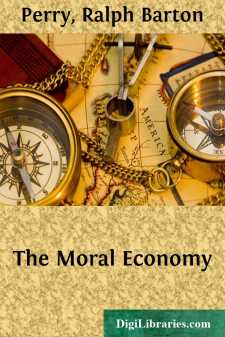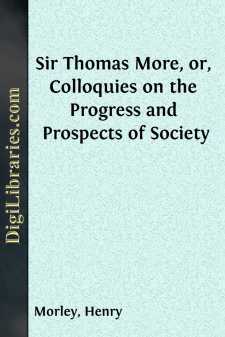Non-Classifiable
- Non-Classifiable 1768
Non-Classifiable Books
Sort by:
by:
Alexander Miles
FRACTURES A fracture may be defined as a sudden solution in the continuity of a bone. Pathological Fractures A pathological fracture has as its primary cause some diseased state of the bone, which permits of its giving way on the application of a force which would be insufficient to break a healthy bone. It cannot be too strongly emphasised that when a bone is found to have been broken by a slight...
more...
CHAPTER I. Long, eventful, and very interesting is the history of the cathedral, or rather of the successive cathedrals, of the ancient city of Rochester. It is many centuries since, in 597, St. Augustine and his fellow missionaries landed on the coast of Thanet, almost on the very spot where Hengist and his bands had disembarked nearly one hundred and fifty years before. Hengist’s descendant,...
more...
CHAPTER I MORALITY AS THE ORGANIZATION OF LIFE In the words with which this book is inscribed, Bishop Butler conveys with directness and gravity the conviction that morality is neither a mystery nor a convention, but simply an observance of the laws of provident living. "Things and actions are what they are, and the consequences of them will be what they will be: why then should we desire to be...
more...
ANCIENT BABYLONIAN AND EARLY HEBREW. From the misty ages of bygone centuries to the present day there has been a gradual interlinking of the literatures of different countries. From the Orient to the Occident, from Europe to America, this slow weaving of the thoughts, tastes and beliefs of people of widely different races has been going on, and forms, indeed, a history by itself. The forerunner and...
more...
DETAILS OF TREATMENT. For forty-eight hours after admission to the hospital the patient is kept on ordinary diet, to determine the severity of his diabetes. Then he is starved, and no food allowed save whiskey and black coffee. The whiskey is given in the coffee: 1 ounce of whiskey every two hours, from 7 a.m. until 7 p.m. This furnishes roughly about 800 calories. The whiskey is not an essential part...
more...
by:
Unknown
CASTING ON WITH ONE NEEDLE The first process in knitting is known by the term CASTING ON. There are two ways of doing this: with one needle, and with two. Our first diagram represents the former process. Take the thread between the second and third fingers of the left hand, leaving an end of about a yard for every hundred stitches; pass it round the thumb of that hand, giving it a twist, so as to form...
more...
by:
Walter Runciman
INTRODUCTORY It was a bad day for Spain when Philip allowed the "Holy Office" to throw Thomas Seeley, the Bristol merchant, into a dungeon for knocking down a Spaniard who had uttered foul slanders against the Virgin Monarch of England. Philip did not heed the petition of the patriot's wife, of which he must have been cognisant. Elizabeth refused the commission Dorothy Seeley petitioned...
more...
CHAPTER I. STATE OF WOMEN AMONG THE ARABS OF THE JAHILIYEH, OR THE "TIMES OF THE IGNORANCE." In that eloquent Sura of the Koran, called Ettekwir, (lxxxi.) it is said, "When the girl buried alive shall be asked for what sin she was slain." The passage no doubt refers to the cruel practice which still in Mohammed's time lingered among the tribe of Temîm, and which was afterwards...
more...
[Scene i] Enter Charles the French King, [Catherine] the Queene Mother,the King of Navarre, the Prince of Condye, the Lord highAdmirall, and [Margaret] the Queene of Navarre, with others. CHARLES. Prince of Navarre my honourable brother,Prince Condy, and my good Lord Admirall,wishe this union and religious league,Knit in these hands, thus joyn'd in nuptiall rites,May not desolve, till death...
more...
by:
Henry Morley
It was in 1824 that Robert Southey, then fifty years old, published “Sir Thomas More, or Colloquies on the Progress and Prospects of Society,” a book in two octavo volumes with plates illustrating lake scenery. There were later editions of the book in 1829, and in 1831, and there was an edition in one volume in 1837, at the beginning of the reign of Queen Victoria. These dialogues with a...
more...











